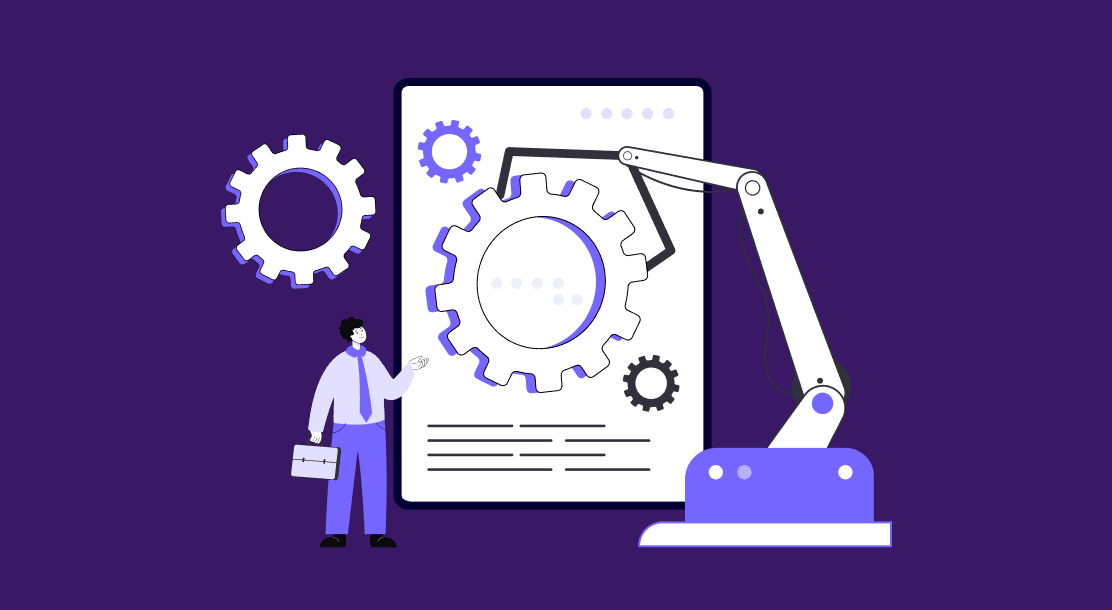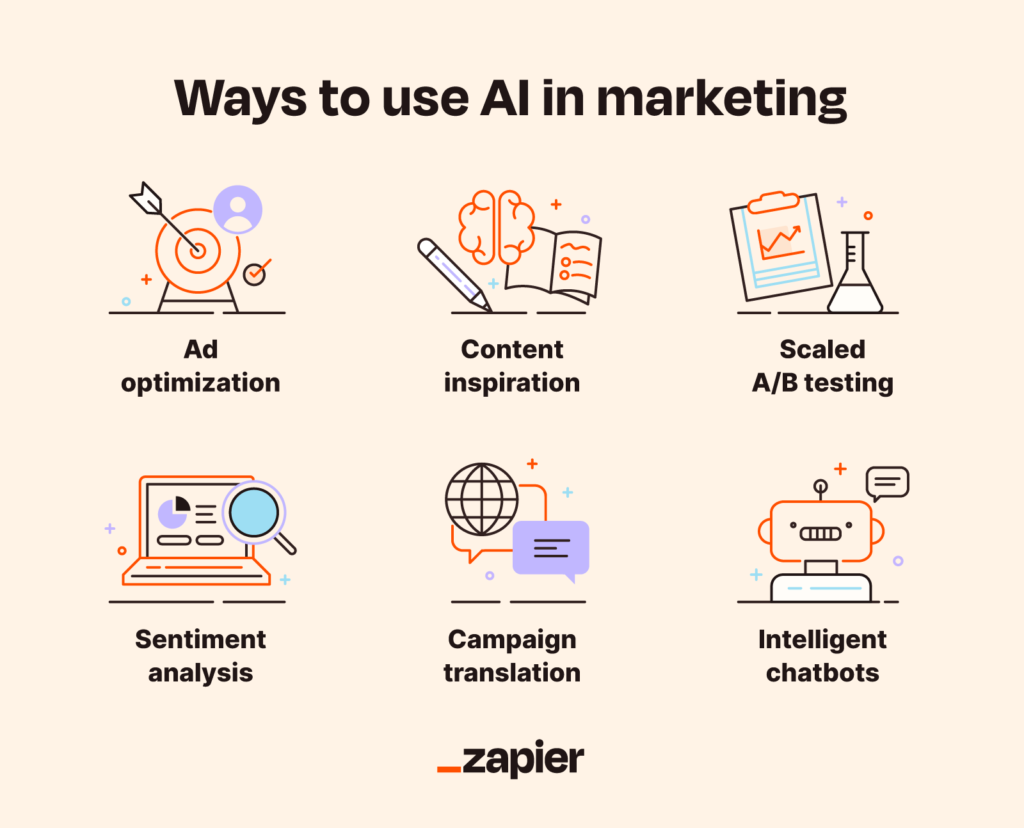AI For Marketing: How (And Why) You Should Build An AI Marketing Strategy

Marketing has been the backbone of businesses. A good marketing strategy and a carefully worked design can grow your business outreach, allowing it to grow. Your business can see spectacular growth if your marketing is carefully designed. With more than half of the world’s population building their presence on the internet, digital marketing is gaining pace.
And artificial intelligence (AI) is speeding up digital marketing. AI for marketing will increase your business outreach and help you make automatic and more accurate decisions. However, it is important to learn how to use AI for better statistics and digital marketing. Here is a brief guide to the what, why, and how of AI marketing.

What is AI for Marketing?
AI marketing analyzes customer data, forecasts consumer behavior, and customizes marketing campaigns. It uses machine learning, natural learning processing (NLP), and other AI technologies. You can use it to automate repetitive operations. It enables you to learn more about customer behavior and provide individualized experiences.
Several business enterprises have been using AI for complex and simple tasks. It has been helping enterprises at almost every stage. With the help of AI in digital marketing, the growth graph for companies is likely to rise.
The Different Types of AI for Marketing
1. Machine learning
Large volumes of data are used to train machine learning algorithms. It is done so that they can make sophisticated predictions and judgments. They can read text, identify photos, and segment audiences. This helps you to predict how audiences would react to your marketing efforts. The most popular AI technologies are machine learning and deep learning. These tools are developing into effective AI marketing tools.

2. Task automation
Automated programs carry out routine tasks that are not intellectually challenging. Examples include sending welcome letters and using chatbots. All these tasks can assist consumers during routine contact but are unable to determine the users’ intentions. It can not provide personalized responses, or accumulate knowledge over time. Examples include chatbots and programs that automatically send greeting emails.
How to Build an AI Marketing Strategy
Utilizing AI in marketing strategies includes many steps. It starts with an analysis of current marketing procedures. It finishes with the implementation, training, and scaling of AI-powered solutions.
Here are the steps included in building an AI marketing strategy.
- Examine your current marketing methods to pinpoint areas where AI might assist you. This is the first step towards maximizing your efforts in digital marketing.
- Find marketing bottlenecks and look for automation solutions. This can help your marketing activities run more smoothly.
- The third step is to explore automation solutions. It helps to automate monotonous operations and increase marketing effectiveness.
- The fourth and last step involves scaling up, training, and implementing these solutions.

Benefits of Using AI in Digital Marketing
AI and marketing integration offers many advantages in digital marketing. It helps personalize the customer experience, enrich performance matrices, and improve productivity. It also helps in a better return on investment (ROI) by increasing revenue.
Other benefits are as follows:
- Customized customer experience
You can use optimized AI algorithms to predict customer preferences. It is done by analyzing and collecting customer data through various sources. These include web browsing activities, history of previous purchases, and information based on demographic. This increases customer satisfaction, loyalty, and other factors, such as relationships with customers. This further results in consumer lasting value and support for a brand. It is raised as a result of individualized recommendations and experiences.
- Better offers and content for customers
You may learn more about the preferences, interests, and behavior of their audience through the analysis of customer data. It also provides content and offers that are better tailored to their needs. They can communicate with clients in real time and offer them individualized advice and help by using chatbots powered by AI or voice assistants. Additionally, it supports SEO and content marketing endeavors.

- Enhanced productivity
AI and marketing integration can help you save time and resources while enhancing your overall productivity. The enhances performance by automating repetitive operations and offering insights into customer behavior. You can automate lead creation, customer segmentation, and other processes using AI-powered solutions. You may operate your business more effectively and make better decisions. AI for marketing also produces better results by reducing processes and offering actionable insights.
- Enhanced revenue
You can boost your revenue through enhanced consumer engagement. AI and marketing streamlines marketing initiatives and spots new revenue prospects. Businesses may improve performance and maintain competitiveness in the current digital economy by utilizing the potential of AI.
Potential Challenges in Using AI Marketing
AI for marketing has helped businesses take better real-time and data-driven decisions. These now lead contemporary marketing. AI tools are still not developed to their full potential. This should be kept in mind before doing any data-driven research. You must be careful when selecting how to include AI in your marketing initiatives and operations.
Other challenges to consider are as follows:
- Data quality and training time
AI marketing tools require time and training to learn about your marketing goals. It can be time-consuming to understand consumer preferences, surfing patterns, context, and expertise. Data quality assurance is also required to guarantee accurate, timely, and representative data judgments. There is a risk of making inaccurate data decisions if algorithms aren’t trained with better-quality data. This inaccuracy will not reflect customer preferences.
- Modifying the marketing environment
AI marketing has disrupted the daily marketing activities of digital marketers. You should analyze the employment that will be eliminated and those that will be created. According to one estimate, marketing technology may replace almost six out of ten current marketing specialists’ and analysts’ professions.
- Gaining support from investors
It may be challenging to convince business investors of the importance of AI for marketing efforts. Assessments like return on investments and efficiency are simple to measure. It can be more difficult to demonstrate how AI and marketing integration has influenced the client experience or brand reputation. Digital marketing teams should make sure they have the appropriate assessment tools. It will help them link their investments in AI to these qualitative advantages.
- Deployment guidelines
AI marketing is a more recent tool in the era of digital marketers. Hence, there aren’t yet clear best practices in place to direct marketing teams’ initial deployments. Each digital marketing team needs to take into account more than simply the potential short-term gains when developing an AI marketing approach.
- Privacy
Both consumers and regulatory bodies are cracking down on how businesses utilize their data. While adding an AI marketing strategy, digital marketing teams must make sure they are ethically employing data related to customers. The data must comply with regulations like GDPR or else they run the risk of facing harsh fines and reputational damage. The use of customer data for marketing personalization may go beyond what is regarded appropriate if your AI marketing solutions aren’t expressly built to adhere to specified regulatory rules.
Wrapping Up
AI for marketing uses technology to automate decisions based on data collecting, data analysis, and market trends. It is frequently utilized in digital marketing campaigns where efficiency is crucial. AI tools use customer profiles and information to learn how to interact with customers. They uses the information and provide personalized messages to customers. In addition to processing a lot of data, AI marketing tools and machine learning algorithms can help enhance productivity, ROI, and efficiency.
Consider Peppertype.ai, which is an innovative solution that enables businesses to streamline their content creation process. It utilizes AI and advanced machine learning to understand your brand and target audience and generate original content for you in over 25 languages. The platform’s AI engine has been trained with over 100K+ of content to understand what would work best for your audience, ensuring that you create engaging and persuasive content on your own.
FAQs
Artificial intelligence (AI) marketing makes automated decisions. It works according to the information and profiles of consumers. This maximizes the effectiveness of digital marketing initiatives.
AI marketing tools can assist firms in developing efficient marketing strategies. It helps by evaluating processes, identifying bottlenecks, and deploying, training, and scaling them.
Latest Blogs
Explore how Google’s 2025 AI search updates triggered ranking chaos. Learn actionable strategies to adapt your SEO for AI Overviews, zero-click searches, and SERP volatility. Stay ahead now.
Learn how to rank on AI search engines like ChatGPT, Perplexity, and Gemini by optimizing your content for authority, structure, and relevance. Stay ahead in AI-driven search with this strategic guide.
Explore the best healthcare SEO services for your medical practice. Improve online visibility and effectively reach more patients in need of your services.